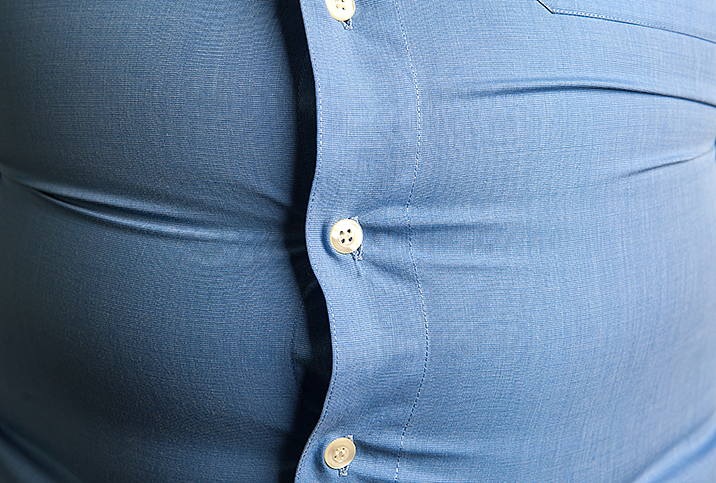6 Ways Obesity and Erectile Dysfunction Are Linked

Despite the findings from many studies over the years that have established a link between obesity and erectile dysfunction (ED), the mechanism directly responsible for this link remains unclear. Nevertheless, research suggests one point: Obesity is independently associated with ED.
In other words, men with more body fat face additional issues with their sexual health and performance.
How can obesity lead to ED—either directly or indirectly—and what adjustments can men make to improve it? Here are six factors to consider.
1. Endothelial dysfunction
The first component of ED to understand is it results from poor circulation, so the quality of erections relies on the health of your blood vessels. Blood rushes through the vessels and fills the corpora cavernosa of the penis, causing an erection.
Crucial to the process is how efficiently the endothelium—the lining of blood vessels—releases nitric oxide, which is responsible for relaxing the smooth muscles and allowing the penis to become engorged.
When blood flow is compromised through arterial damage, ED can occur. Men who are obese typically have a suboptimal diet that results in the elevation of cholesterol and triglycerides, according to Judson Brandeis, M.D., a urologist and men's health expert in San Ramon, California. In addition, they experience high inflammation, which can narrow the endothelium and restrict blood flow to the penis.
"This results in blockage of the 1-millimeter to 2-millimeter arteries that lead to the penis," Brandeis explained. "Narrowing these arteries results in a decrease in penile blood pressure, which is the cause of erectile dysfunction."
2. Hormonal imbalance
Obesity typically results in significantly decreased testosterone levels as well. Excess body fat converts testosterone to estrogen, and such a hormonal imbalance may impede a man's ability to achieve and maintain an erection. Low levels of testosterone can be a cause of erectile dysfunction.
"This is because testosterone is responsible for the development and maintenance of sexual function in men," said Eugene Symaco, M.D., an internal medicine specialist with Mayflower Medical Group in Covina, California. "When a man is obese, his body may not produce enough testosterone, resulting in difficulties achieving or maintaining an erection."
3. Oxidative stress
Another mechanism by which obesity could cause ED is through oxidative stress arising from excess fat. Oxidative stress causes cell and tissue damage by creating an imbalance of the body's free radicals and antioxidants, which could lead to nitric oxide disruption.
For fertility health consultant Mark Henein, who owns a practice in Ashburn, Virginia, "balance is everything" when trying to understand ED. He said it's important to look at functional markers, such as blood chemistry, and then assess and determine the necessary changes to bring the body back to balance.
"Oxidative Stress in Obesity: A Critical Component in Human Diseases," a 2015 systemic review published in the International Journal of Molecular Science, suggested that excess fat increases inflammation and supercharges free radical production in immune cells. When free radicals overwhelm the body's antioxidants, oxidative stress ensues.
"Your heart needs to work harder to pump blood throughout your body, which could strain your cardiovascular system," Symaco explained. "Eventually, blood flow to the penis would be restricted."
Therefore, lower nitric oxide production caused by oxidative stress could indirectly explain why obesity places men at risk for ED. Indeed, a 2011 study published in the International Journal of Impotence Research indicated abdominal obesity is linked to lower vascular nitric oxide and associated with men who have complications with erectile dysfunction.
4. Insulin resistance
Insulin resistance can be a resultant pathway for obesity to cause ED through endothelial dysfunction, according to a 2013 study. In addition, insulin resistance places a person at risk for metabolic syndrome, a group of conditions that includes type 2 diabetes mellitus, high blood pressure, hyperinsulinemia, hyperglycemia, hypertriglyceridemia, low HDL levels and elevated C-reactive protein.
Obesity can lead to diabetes, another potential factor in erectile dysfunction. Brandeis explained that as blood sugar reaches high levels, the body produces less nitric oxide, which means an insufficient amount of blood flows into the penis during an erection. People with diabetes usually have low levels of nitric oxide. Moreover, obese and insulin-resistant men are also expected to have reduced testosterone levels.
Metabolic syndrome places obese people at risk for stroke, heart disease and diabetes. Symaco said obesity could cause heart disease, which can lead to erectile dysfunction because the heart is responsible for pumping blood to the penis. If the heart is not functioning properly, the penis does not receive enough blood flow, resulting in difficulties achieving or maintaining an erection.
5. Physical inactivity
Physical activity independently predicts normal erectile function, according to a 2011 study in the journal BMC Cardiovascular Disorders. Obese or overweight people tend to have a sedentary lifestyle, making them vulnerable to arterial diseases that lead to the development of ED.
The lack of physical activity weakens the body's capacity to metabolize glucose and produce sufficient nitric oxide to promote erectile function.
6. Psychological factors
Beyond biological and hormonal determinants, psychological factors can explain the link between obesity and ED. Obese and overweight men tend to develop poor body image, and society's stigmatization of obesity can lead to poor self-concept.
A 2017 study titled, "Body Image, Weight and Self-Concept in Men," published in the American Journal of Lifestyle Medicine, found that when men and women are dissatisfied with their bodies, they resort to avoidant behaviors and isolation. These behaviors involve less physical activity and difficulty forming sexual intimacy in later life, which may eventually contribute to ED.
Ways forward for men with ED
What can overweight and obese men do to improve erectile function? Of course, intervention depends on the cause of the ED, but some general recommendations can help most people:
- Physical activity. Studies have concluded regular physical activity is the first-line treatment option for men presenting with ED. Try a combination of exercise modalities for maximum therapeutic benefit. Thirty to 60 minutes of exercise daily is essential to circulatory health.
- Diet regimen. Brandeis recommended a high-protein, low-carbohydrate diet with high fiber, healthy fats and reduced sugar.
- Medication and boosters. Among men whose ED is caused by a drop in their testosterone, diet and exercise may not have an immediate effect. For instance, taking a nitric oxide booster is an easy way to improve circulation. In some cases, physicians may prescribe additional testosterone in oral form, topical gels or patches. In extreme cases, testosterone may be delivered by injection or intravenously.
- Lifestyle changes. Increasing water intake, quitting smoking and decreasing alcohol and caffeine intake can improve circulatory health.
- Counseling. Getting counseling is an essential step in ED treatment. As Symaco suggested, erectile dysfunction may have underlying causes, such as anxiety, depression, stress or relationship problems.
If you are overweight and suffering from erectile dysfunction, talk to your doctor about the best treatment. Several options are available, and the best one for you depends on your individual situation.


















